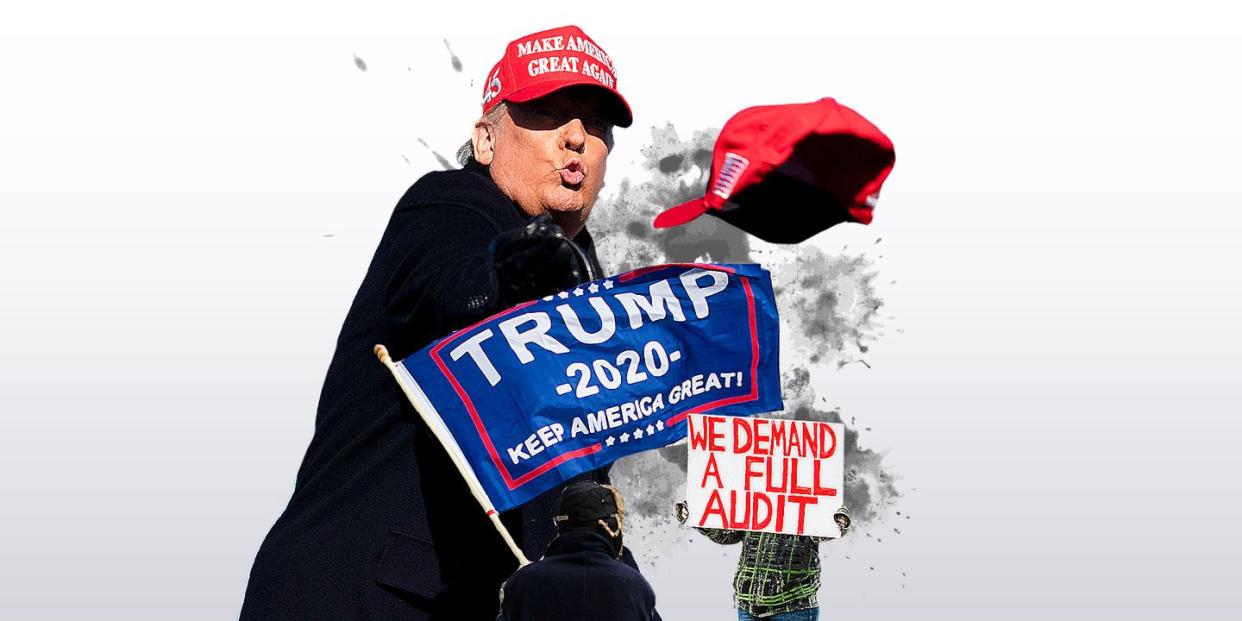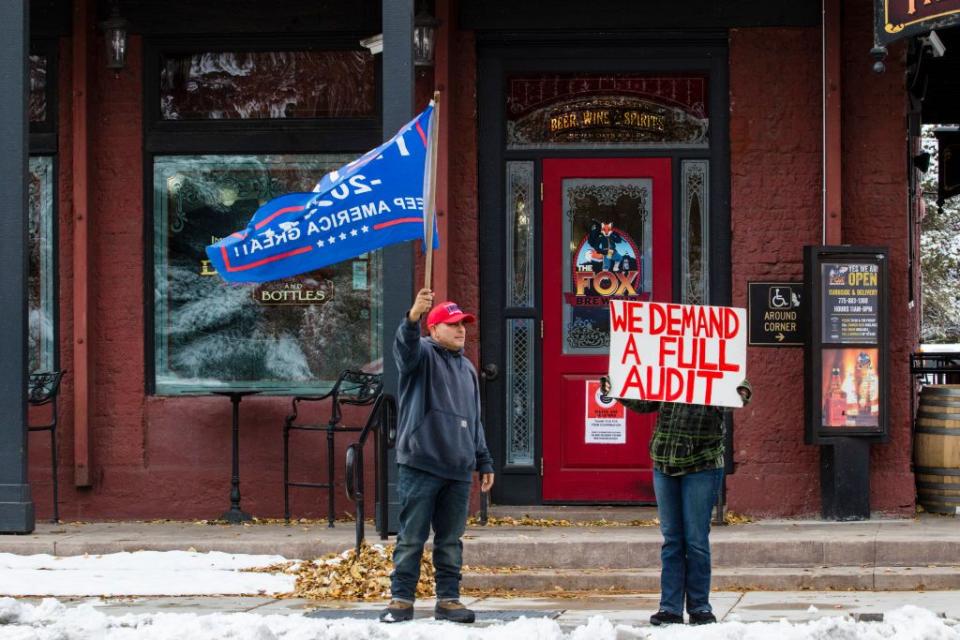On Election Night, American Racism Was Quantified

Lest someone deem me a pessimist or, worse, a fatalist, I shall begin on a note of optimism: My mother, a Black woman who was born in Alabama near the inception of the civil-rights movement, voted for the first time in more than three damn decades.
Three!
Be that as it may, the vote tally in the election of Joseph R. Biden Jr. confirmed for me that we do not have, nor have we ever had, anything resembling a United States of America, affirmed for me that for a multitude of people who believe they are white, the Civil War is not some bygone lost cause but a perennial imperative to secure their supremacy—a calling they heed even if it harms large numbers of them, even, goddamnyoume, if the ultimate expense is their (and our) assured extinction.
To understand what I feel about 2020, I must recollect the election of 2016, back when I was a professor at NYU, slugged the morning after into my favorite diner on campus, ordered my waffles, and sat crestfallen in a booth. The servers, most of them Turkish immigrants, were not only not dejected by the results, they were bopping around the restaurant with wide-ass grins. The source of their levity was confirmed when one of them nudged the banker type in the booth ahead of me. “Heey, Trump. You vote for Trumpp? he said and flashed a thumbs-up. The man smirked and nodded yes.
Nooo. It took everything in me not to shoot out of my seat, stomp out of the diner, and swear off patronizing it ever again in my life. That whole day, the next day, and several days thereafter, I was keenly, acutely aware of white people’s joy. Anyone who so much as intimated happiness was an instant suspect, was someone who voted for a white man who, far as I could tell—he’d shown many telltale signs over the years—had rode into the White House on the winds of white supremacy. Every white person who appeared pleasant, who looked me square in the eye, who avoided my gaze, shit, every white person who breathed, all of them were possible racists. Or else were whites willing to look the other way while the country elected a racist. (Is there a difference?)
It mattered little to me that I then lived in a blue state. New York was also home to my Turkish servers and too many people looking smug on the subways. The visages I witnessed brought into hella sharp relief a truth that hovers over my life—the life of every Black person no matter how rich or famous or educated or rapper-foolish—that a great number of the people who believe themselves white would rather me dead or enslaved. Enslaved until I’m dead.
Call it hyperbolic if you want, but if you recall that this was the ethos of the antebellum South, if you believe the wisdom of Dr. Martin Luther King Jr. that the ultimate aim of racism is genocide, well, then it’s an irrefutable truth.
And let me tell you, deciphering the intention of every white person one meets is draining, degradative work; and let me confirm that the wariness born of that work soon transmuted me into a worse version of myself. For a time, it burnt some of the good out of me, tamped down my hope, tempered my forbearance, generosity, grace. If I’m honest, for weeks, months, maybe longer, I failed at hating white people as a collective, had let their illogical ill will toward me and mines corrupt me into the kind of human I loathed.
And all that happened in 2016.
In the intervening years, I worked hard to recover myself out of that kind of pathology, did it despite the plenitude of proof that this kakistocratic president and his supporters were right who the hell I thought they were. It was a hard task, to say the least. But alas, here I am in 2020.
And here’s what we got in the 2020 election:
You can bet, if they championed one at all, Donald J. Trump was the presidential choice of all the white supremacists, white nationalists, racists. How can he own the committed support of white supremacists and claim to support Black people, or any group other than whites for that matter? He can’t. Those are diametrically opposed constituencies. And I ain’t buying talk of his stance on “issues” being anything more than a minor factor in their backing. That white people sanctioned him despite his manifold failures testifies that their support wasn’t, at heart, political but was, in fact, ideological.
But at least now we know how many racists there are in the U. S. of A. And that’s unprecedented: the data.
How many, you ask? Try Trump’s final vote count.

For truth, I never fully recovered my faith in white people (faith because much of it is belief in things unseen). Still, with something approaching it, I tuned in on November 3 to watch election coverage, watched half-hedging that these Disunited States had somehow become something other than what they were in 1619, in 1916, in 2016—a country committed to the dynamic oppression of my people, a republic divided by and large by racism and the telos of white supremacy.
Not to mention a place that without my vigilance could regress me into somebody I’d rather not be.
Every vote for Trump summoned my old anxieties, reaffirmed the ethos of a national superminority, one that clarifies the America that exists in real life, not theory, a vision codified many times over.
If not for COVID, I’d be zipping around Chicago, engaging with white folks—by which I mean people whose identity is grounded in belonging to the white race—and no doubt wondering, somewhere on the scale between every-single-time and more-often-than-not, if the white person I encountered was some grade of a racist.
It’s a calculus with the potential to drive you kissing close to insane.
You could examine the exit-poll data until your head explodes, but nothing is more indicative of the will of white people than the fact that Trump—Mr. What-do-Black-people-have-to-lose; Mr. Very-fine-people-on-both-sides; Mr. Black-Lives-Matter-activists-are-terrorists; Mr. Proud-Boys-stand-back-and-stand-by; Mr. I’ve-done-more-for-Blacks-than-any-president-since-Lincoln—pretty much won the Confederacy.
Want unlimited access to Esquire + the print magazine? Join Esquire Select here.
Add to that national litmus test on racism that even in the so-called blue states, in the domain of the so-called blue walls, the so-called bulwarks of liberalness: 943,000 people voted for him in my home state of Oregon; 4.7 million in the liberal western paragon of California; 2.8 million in the Diversity Inc. known as New York; 113,000 in Vermont! Of the record 150 million votes tallied, a racist, misogynistic, xenophobic sociopath who’s dishonored soldiers, invited election interference, and mishandled a pandemic that has killed a quarter million people, that same malevolent white man received a vote of confidence from at least 71 million Americans. Not all white voters were for Trump. But according to a CNN exit poll, 57 percent of them were.
The apologists love to counter that not all white Trump voters are racists or white supremacists. But that’s semantics. Whether someone identifies as a white supremacist or calls themselves something else but justifies support of white supremacists, they still belong to a group who, if they had it their way, would rather see me and my peoples shackled, stooped in servitude, or buried.

Back in 2016, people could claim they didn’t know the depths of his supremacist feelings. But now? Those 71 million fellow Americans are now registered racists.
To which I say, better to know than not.
To which I say, Trump was not an aberration but the expression of the long, deep longing of those bigoted millions. Nevertheless, add to those disheartening truths the proof that Black people, my people, are in the main a resilient sort, that we continue to vote for hope, continue to fight for the right to be full humans.
And here’s what that looks like in practice:
Never losing track of the insidious ways white supremacy works to injure the people about which I care. It means having tough conversations with my kids; persuading them to read the works of people keen on the history of race and class and justice here and elsewhere; encouraging them to sacrifice their time and privilege when the moment insists, which it will. It demands modeling what I ask of them. It involves nudging my mother, with whom I’ve never talked politics, into meaningful conversations about them. It involves fostering discourse about race and privilege in my classrooms, assigning texts by Black writers and other people of color. It involves correcting or challenging friends or colleagues when they say something I recognize as racially biased. It means continuing to write about my people, trying to make sense of where we are and where we go. It involves a lifetime embargo on arguing with fools. It means the next time I hear a server cheer a racist, I stomp out the restaurant for good. It requires staying abreast of important issues beyond election years. It means refusing to let the hate of a racist transmute me into a lesser self, not because I love my enemy but rather, I shall not become them. It means knowing that all the above is required of me for all of my livelong days, no matter who lives in the White House.
And for sure, for sure, it includes acknowledging progress when I see it.
Progress like: my daughter who at nineteen voted in her first election, and who has ahead of her a lifetime of elections to register her resistance to hate. Again, and again.
Go, Justice.
This article appears in the Winter 2020/21 issue of Esquire.
Subscribe here
You Might Also Like

